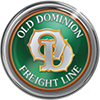Adopting the eBOL API Standard: Top 3 Benefits for Your Business
The logistics and transportation industry is undergoing rapid digital transformation. One key innovation is the adoption of a standard for electronic Bill of Lading (eBOL) APIs.
An API (Application Programming Interface) allows you to transfer key shipment details in real time - including shipper and consignee information, type of goods being shipped, freight class, and other details – from your current internal systems directly to your transportation provider.
In August 2023, the National Motor Freight Traffic Association (NMFTA) introduced the first standardized API for Electronic Bill of Ladings (eBOLs). With the participation of over 70 affiliates – including Old Dominion – shippers now require only a single API configuration to function across all participating carriers, TMS providers, and 3PLs. The NMFTA’s Digital LTL Council unveiled its advanced eBOL 2.1 standards in March 2024.
API Standards and the Future of LTL Shipping
Automation and digitization are rapidly transforming the LTL industry, enabling improved planning, pricing, service, and relationships among carriers and shippers.
Listen as Barry Craver, VP of Technology at Old Dominion, and Paul Dugent, Executive Director of the Digital LTL Council under the National Motor Freight Traffic Association, discuss the future of LTL shipping.
The new standard will reduce costs and errors and improve communication and customer service. With one digital format in place, BOL data will be exchanged hours earlier than before, and the information will be more accurate and concise than it has been in the past. Furthermore, adopting the new eBOL standards reduces paper waste and carbon emissions, and seamlessly aligns businesses with global sustainability goals.
Enhanced Flexibility
The Bill of Lading API standard grants shippers the advantage of integrating one API across multiple carriers, TMS systems, or 3PLs. It reduces your internal workloads and allows you to focus on your business.
A single configuration also eliminates the headache of dealing with multiple, non-standardized formats, allowing shippers to save time and resources and increase their flexibility in working with different carriers.
In addition, eBOL APIs streamline the process of onboarding for new carriers. By using the standardized API, shippers can easily connect with carriers without needing to develop their own integration methods. This allows for quicker and smoother setup processes, ultimately leading to faster service and improved customer satisfaction.
Minimized Errors and Lower Costs
Manual, handwritten bills of lading often introduce human error. This leads to handwritten errors, inaccurate billing, and inefficient data transmission. Digitizing bills of lading reduces these mistakes by automating data entry and processing.
Consider a case study from a large LTL shipper in the commercial printing sector. Despite having an enterprise TMS, they were largely relying on manual processes for operations. However, after the implementation of API connections into their TMS, they digitized their shipment processes, including their Bills of Lading, resulting in a significant $250,000 per year reduction in costs by minimizing 700-900 daily manual calls*. They experienced speedier and more efficient shipments, fewer manual errors, and enhanced customer communication.
Additionally, the Digital LTL Council reported that shippers can expect to see an average of 2-4% cost savings per shipment once full adoption of the eBOL. The savings come in the form of greater network efficiency and on-time performance, improved carrier performance, decreased dwell times, reduced safety stock levels, and better worker efficiencies. Industry-wide, this means an estimated savings of $470 million.*
Improved Communication and Carrier Service
Efficient communication with your carrier is critical, especially when you need on-time performance. The single standardized eBOL ensures that shipment data is exchanged clearly and instantly - improving communication between shippers and carriers.
You can also experience better service quality from your carrier. With a single digital format, carriers can transfer and process eBOL data in real time, saving valuable work hours. This clean, concise data format enhances accuracy, leading to improved carrier service.
Bill of Lading Digitization Is the Future
The NMFTA’s advancements in bill of lading digitization, including their recent BOL 2.1 standards, demonstrate that the shipping industry is quickly adopting widespread digital transformation. The NMFTA is continuously developing more APIs to assist with various business processes, including in-transit visibility, tracking, and rating. You can familiarize yourself with them here.
In a world where both speed and service quality matter, implementing a standard eBOL can help you optimize both. Enhanced service will only refine your processes over time, strengthening your relationship with your carrier and clients.
*According to NMFTA’s July 2023 Digital LTL Council Case Study.
